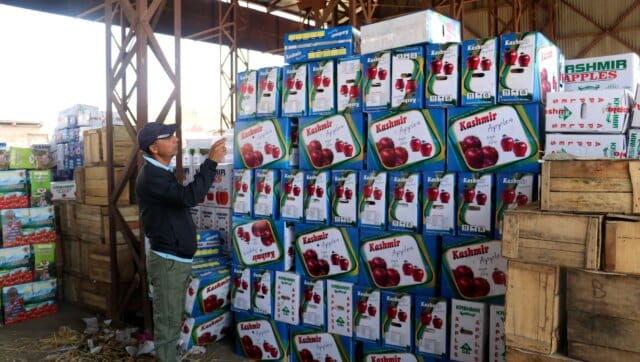Srinagar, Sept 23: The future of Kashmir’s apple industry is under serious threat due to systemic shortcomings that remain unaddressed for decades, warned Mukhtar Ahmad Khan, former Area Marketing Officer (AMO) of the Horticulture Planning and Marketing Department. He described the situation as precarious, saying that unless immediate reforms are initiated, the Valley’s most vital agricultural sector could be pushed to the brink.
Khan pointed out that the industry lacks basic post-harvest infrastructure, which has left orchardists vulnerable year after year. Modern cold storage facilities, controlled atmosphere (CA) units, and fruit processing plants are either absent or too limited in scale to meet demand. He explained that Kashmir has no facilities for processing C-grade apples, which end up wasted, and there are no CA storage units capable of handling nearly 10 lakh metric tonnes of A-grade fruit. Without this storage cushion and with no reliable all-weather transport system, the sector, he said, is exposed to collapse whenever there are delays in dispatching produce to outside markets.
The introduction of High-Density apple plantations, which were meant to be a turning point for the industry, has added another layer of complexity. While these plantations have boosted yields, they require earlier harvesting and quicker distribution. Khan warned that without storage and processing buffers, the system is overwhelmed by sudden surges of produce, which can easily turn disastrous if transport routes are disrupted. “We lack the CA storage cushion to handle this surge, which makes the system vulnerable to collapse in case of transport delays,” he explained.
The crisis, however, is not limited to infrastructure. Khan noted that the absence of a comprehensive export policy has prevented Kashmiri apples from tapping into international markets. Equally damaging is the lack of a Minimum Support Price (MSP) or price-support scheme, leaving farmers exposed to the volatility of open markets dominated by middlemen. He argued that a robust MSP mechanism would provide stability to growers and protect them from distress sales, especially in years when market prices dip below production costs.
Another pressing concern highlighted by Khan is the unregulated sale of pesticides. He said that substandard and overpriced agricultural chemicals are freely circulating in the market, putting both farmers and the environment at risk. Without a dedicated Pesticide Regulatory Authority, there is no mechanism to monitor quality and pricing. This, he stressed, not only burdens farmers financially but also poses long-term ecological dangers that could damage soil health and undermine the sustainability of apple cultivation.
Khan insisted that meaningful reform must begin with improving and maintaining road connectivity across fruit-producing belts, particularly during the harvest season. Better roads would allow growers to move their produce quickly, reducing losses during critical periods. He also underscored the need for expanding cold storage and pack house facilities in every fruit-growing district so that orchardists can store their produce instead of being forced into immediate sales. In addition, he said that subsidised anti-hail nets should be provided on a large scale to safeguard crops from weather-related disasters that often destroy orchards within minutes.
He maintained that the apple industry cannot survive on piecemeal solutions and requires a holistic approach. This includes a strong export policy to help growers access international markets, the introduction of MSP to stabilise farmer incomes, and the establishment of a regulatory authority to oversee the pesticide market. Without these steps, he cautioned, the Valley’s most important horticultural sector will continue to remain fragile. [KNT]








